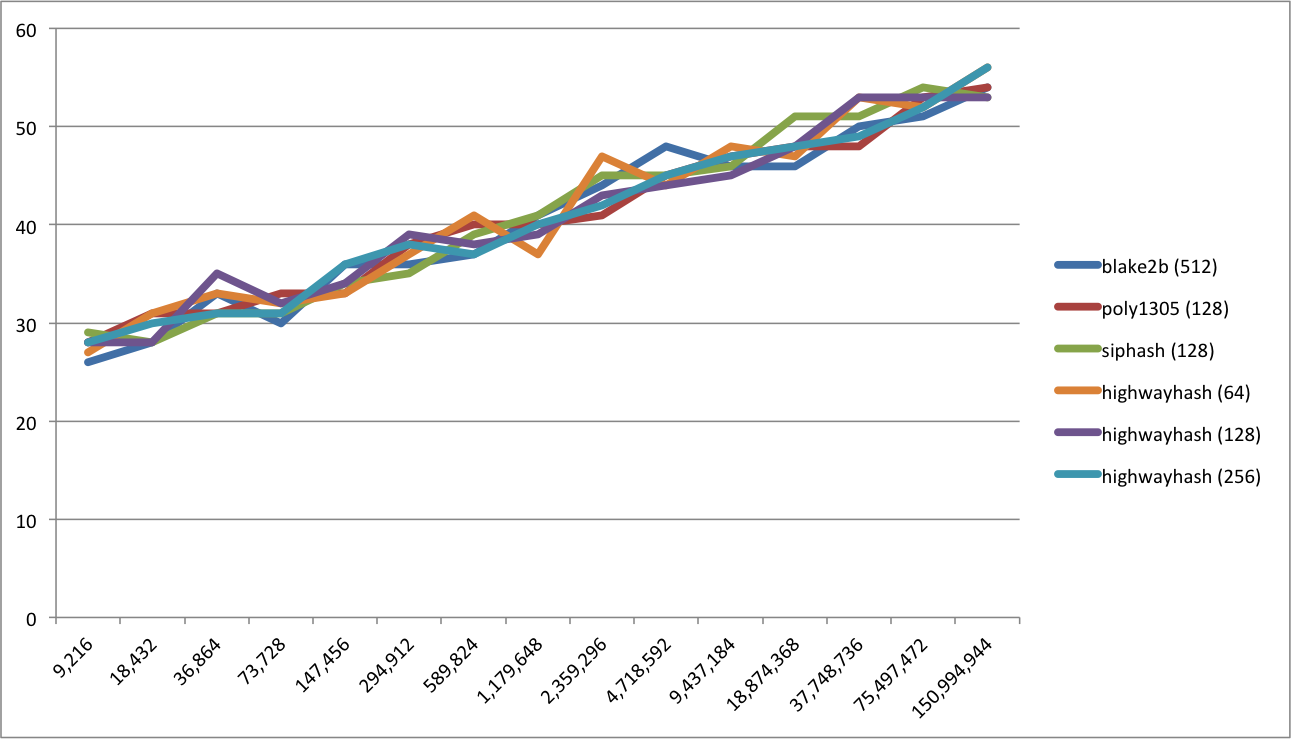 Documentation
¶
Documentation
¶
Overview ¶
Package highwayhash implements the pseudo-random-function (PRF) HighwayHash. HighwayHash is a fast hash function designed to defend hash-flooding attacks or to authenticate short-lived messages.
HighwayHash is not a general purpose cryptographic hash function and does not provide (strong) collision resistance.
Index ¶
Examples ¶
Constants ¶
const ( // Size is the size of HighwayHash-256 checksum in bytes. Size = 32 // Size128 is the size of HighwayHash-128 checksum in bytes. Size128 = 16 // Size64 is the size of HighwayHash-64 checksum in bytes. Size64 = 8 )
Variables ¶
This section is empty.
Functions ¶
func New ¶
New returns a hash.Hash computing the HighwayHash-256 checksum. It returns a non-nil error if the key is not 32 bytes long.
Example ¶
ExampleNew shows how to use HighwayHash-256 to compute fingerprints of files.
key, err := hex.DecodeString("000102030405060708090A0B0C0D0E0FF0E0D0C0B0A090807060504030201000") // use your own key here
if err != nil {
fmt.Printf("Cannot decode hex key: %v", err) // add error handling
return
}
file, err := os.Open(".gitignore") // specify your file here
if err != nil {
fmt.Printf("Failed to open the file: %v", err) // add error handling
return
}
defer file.Close()
hash, err := New(key)
if err != nil {
fmt.Printf("Failed to create HighwayHash instance: %v", err) // add error handling
return
}
if _, err = io.Copy(hash, file); err != nil {
fmt.Printf("Failed to read from file: %v", err) // add error handling
return
}
checksum := hash.Sum(nil)
fmt.Println(hex.EncodeToString(checksum))
Output: 0a379f2bd8c9c1c6a501f3c327ce7efd10d98148d2c5c787d59b3171970daa65
func New128 ¶
New128 returns a hash.Hash computing the HighwayHash-128 checksum. It returns a non-nil error if the key is not 32 bytes long.
func New64 ¶
New64 returns a hash.Hash computing the HighwayHash-64 checksum. It returns a non-nil error if the key is not 32 bytes long.
Example ¶
ExampleNew64 shows how to use HighwayHash-64 to implement a content-addressable storage.
key, err := hex.DecodeString("000102030405060708090A0B0C0D0E0FF0E0D0C0B0A090807060504030201000") // use your own key here
if err != nil {
fmt.Printf("Cannot decode hex key: %v", err) // add error handling
return
}
AddressOf := func(key []byte, file string) (uint64, error) { // function to compute address based on content
fsocket, err := os.Open(file)
if err != nil {
return 0, err
}
defer fsocket.Close()
hash, err := New64(key)
if err != nil {
return 0, err
}
_, err = io.Copy(hash, fsocket)
return hash.Sum64(), err
}
dir, err := ioutil.ReadDir(".")
if err != nil {
fmt.Printf("Failed to read current directory: %v", err) // add error handling
return
}
lookupMap := make(map[uint64]string, len(dir))
for _, file := range dir {
if file.IsDir() {
continue // skip sub-directroies in our example
}
address, err := AddressOf(key, file.Name())
if err != nil {
fmt.Printf("Failed to read file %s: %v", file.Name(), err) // add error handling
return
}
lookupMap[address] = file.Name()
}
Output:
func Sum ¶
Sum computes the HighwayHash-256 checksum of data. It panics if the key is not 32 bytes long.
Types ¶
This section is empty.
